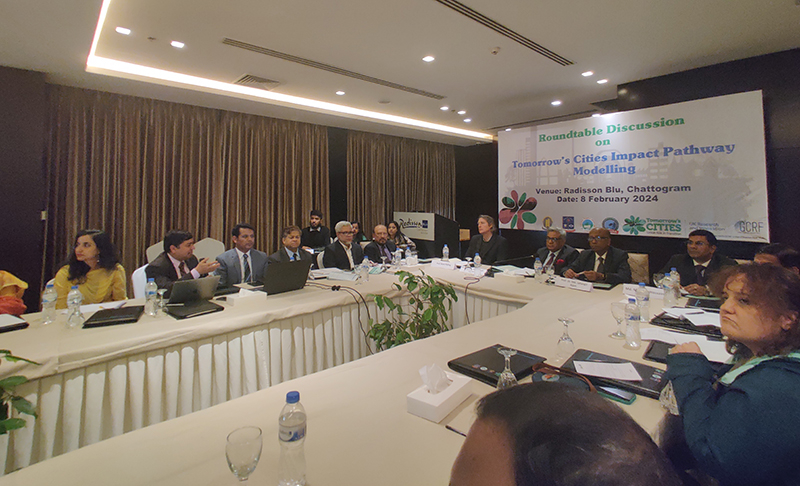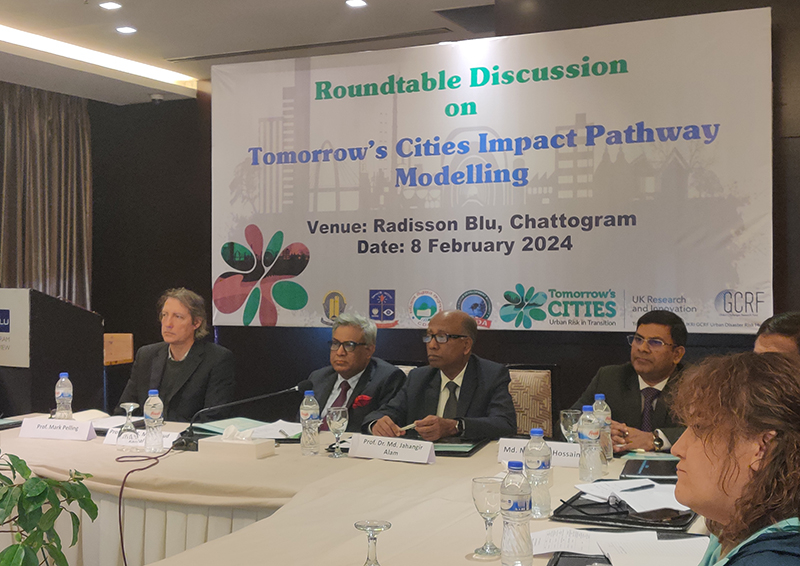
A recent roundtable discussion on Tomorrow’s Cities Impact Pathway Modelling showcased significant advancements in Bangladesh's urban development and disaster risk reduction strategies. Hosted by the Department of Disaster Science and Climate Resilience, Dhaka University, the event featured presentations from global experts and local stakeholders, shedding light on the concept, methodology, and implementation of Tomorrow’s Cities framework in the region.
Building Tomorrow’s Chattogram & Cox’s Bazaar
In a dynamic exchange of ideas and insights, the Department of Disaster Science and Climate Resilience at Dhaka University (DU) recently organised a roundtable discussion focusing on Tomorrow’s Cities Impact Pathway Modelling. This collaborative effort aimed to explore the progress and challenges encountered in implementing Tomorrow’s Cities framework in Bangladesh.

Key speakers at the event included Professor Mark Pelling from University College London (UCL), who provided an overview of Tomorrow’s Cities strategy for inclusive risk-informed urban planning; Ramesh Guragain, Deputy Executive Director at National Society for Earthquake Technology (NSET) -Nepal who enlightened the audience about Tomorrow’s Cities work in Kathmandu and Professor Basir Zisan from the Chittagong University of Engineering & Technology who gave an insightful presentation on the recent progress of deploying the TCDSE in Chattogram. Additionally, local experts, including representatives from the Chittagong Water Supply and Sewerage Authority (CWASA), the Institution of Engineers Bangladesh (IEB), and the Ministry of Housing and Public Works (MoHPW), shared valuable insights into the adaptation of Tomorrow’s Cities framework to the Bangladeshi context.
The roundtable discussion, chaired by Professor Dr. Md. Jahangir Alam, Vice-Chancellor of Rajshahi University of Engineering and Technology (RUET), fostered an engaging dialogue among stakeholders. Participants included esteemed figures such as department heads, deans, and industry leaders, each offering unique perspectives on the integration of Tomorrow’s Cities principles into urban planning and disaster risk reduction efforts.
Highlighting the importance of this collaborative initiative, Anika Samma-A and Tasnim Jabin Jui, Lecturers from DU's Department of Disaster Science and Climate Resilience, underscored the significance of Tomorrow’s Cities in shaping resilient and sustainable urban futures.
As Bangladesh continues to grapple with the complexities of urbanisation and climate change, forums like these serve as catalysts for innovation and cooperation. By harnessing the expertise of global thought leaders and local stakeholders, Tomorrow’s Cities aims to drive meaningful change and build a brighter, more resilient future for all.